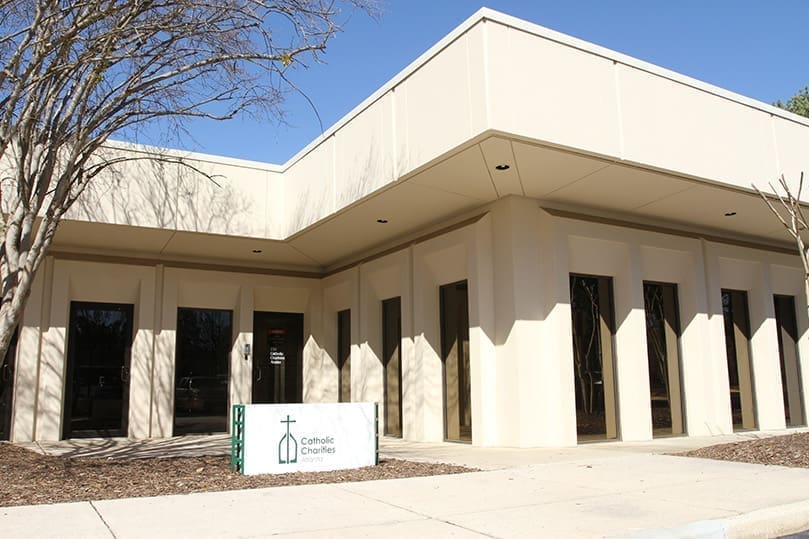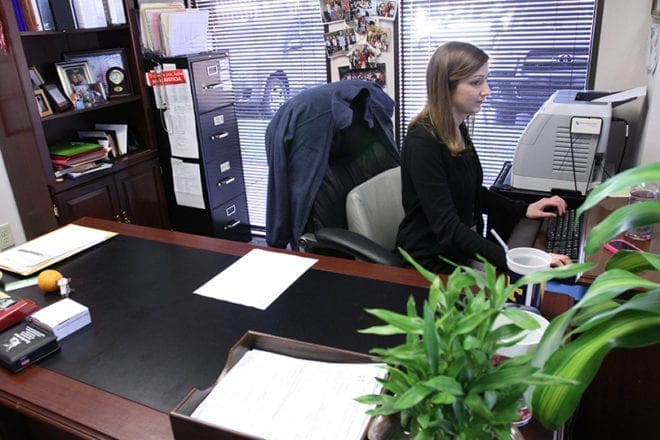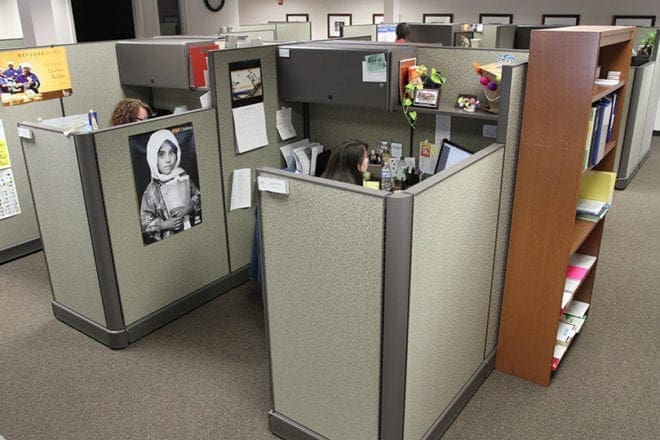 Photo By Michael Alexander
Photo By Michael AlexanderAtlanta
Catholic Charities Opens New Northlake Office
By STEPHEN O'KANE, Staff Writer | Published March 15, 2012
The Immigration Legal Services and Refugee Resettlement arms of Catholic Charities Atlanta have found a new home in an office park off Northlake Parkway just inside the Atlanta Interstate-285 perimeter.
The Catholic Charities services moved from their former location on West Peachtree Street in Midtown Atlanta to an office near Northlake Mall, increasing their space and accessibility for clients. The move was completed in January and the staff has been focused on providing continued dedicated service during the transition.
“January was a busy month for us in terms of arrivals,” said Frances McBrayer, senior program director of Refugee Resettlement Services for Catholic Charities Atlanta, who added that the staff successfully balanced aiding families with the task of unpacking and setting up the new office.
“Our staff is so flexible it just didn’t really interrupt their flow,” McBrayer said. “It’s been a really nice transition.”
Positioned adjacent to the International Rescue Committee, the staff at the Northlake office are pleased to be working hand-in-hand with another refugee resettlement organization.
“We are working very closely with them,” said Joseph Galvin, chief operating officer of Catholic Charities Atlanta, who added that Catholic Charities often provides legal services for IRC clients.

Frances McBrayer, the program director for refugee resettlement services, works from her new Catholic Charities office located in DeKalb County’s Northlake section. Photo By Michael Alexander
Galvin said Catholic Charities had clients walk in the door the first day they opened the new office.
“We’ve had no shortage of clients,” he said.
The ample free parking and ease of access from the interstate have already revealed the benefits of the new space, he said.
The Northlake office is split into two areas, one for Refugee Resettlement and the other for Immigration Legal Services. Private meeting rooms and offices on both sides allow the staff and clients to talk confidentially, while extra storage space allows Catholic Charities to accept more donated items to be provided to new clients.
“The space is just so much more useful for us,” said McBrayer.
“It’s a great location,” added Dana Ford, business manager for Immigration Legal Services. “The move has been beneficial.”
According to Catholic Charities, there are over 14.2 million refugees worldwide and approximately 80 percent are women and children. Only 1 percent of the world’s refugees are resettled into another country each year.
Some 55,000 refugees will be resettled in the United States in federal fiscal year 2012. Refugees are individuals who have fled their countries of origin and meet the United Nations’ criteria of having a “well-founded fear of persecution for reasons of race, religion, nationality, membership of a particular social group or political opinion.”
Catholic Charities Atlanta expects to resettle approximately 250 refugees this fiscal year. Refugees are arriving from Bhutan, Burma, Iraq, Iran, Afghanistan, Cuba, Somalia, Congo, Rwanda, Burundi, and many other countries.
Some 92 percent of refugees participating in the Catholic Charities Atlanta Match Grant early self-sufficiency program are self-sufficient within six months of arrival. The average for all refugee participants in the state of Georgia is 80 percent.
The Refugee Resettlement program provides services to refugees, people seeking asylum, victims of human trafficking, and Cuban and Haitian entrants. In addition to initial resettlement services, the staff provides employment services, social adjustment services, a short-term refugee internship program (SHIP), job skills classes, volunteer opportunities, and many other services that individual clients need.
Catholic Charities works in affiliation with the U.S. Conference of Catholic Bishops, the U.S. Department of State, and the U.S. Department of Health and Human Services.
There are 15 people on staff with Catholic Charities Refugee Resettlement program and three social work interns from local universities. The staff itself represents 14 different cultures and 19 spoken languages either through birth, foreign service or first-hand refugee experience.
“Everybody here puts 150 percent into what they do,” McBrayer said of the staff, whom she described as “committed” and “incredible.”
“They go above and beyond in almost everything. … The reason that they do it is because they want the clients to succeed,” she said.
The Immigration Legal Services arm of Catholic Charities Atlanta acts as an immigration law firm, providing low-cost, quality legal immigration services to more than 6,000 clients annually.

Krista Greiner, left, employment specialist, and Laura Simons, job developer, work at the desks of their cubicles inside the new Atlanta Catholic Charities office located in Atlanta’s Northlake area. Photo By Michael Alexander
The multilingual staff of nine specializes in immigration law and helps eligible individuals and families to obtain permanent legal status, assists clients with the naturalization process and provides legal representation during deportation proceedings. They also assist survivors of domestic violence, abandoned or neglected foreign children, detained clients and victims of trafficking and crimes.
Catholic Charities Atlanta Immigration Services program includes five main service areas: immigration family law, assisting both individuals and family in obtaining legal status and naturalization; immigrant juvenile program, which provides consultation and legal representation to immigrant children; the immigration detention project, which assists immigrants detained by U.S. Immigration and Customs Enforcement who are unable to afford private counsel; Violence Against Women Act, working with immigrant children who have been abused, neglected or abandoned by their families; and workshops and public education for advocacy, provided through 20 to 30 informational workshops for community agencies and organizations. The largest percentage of immigration cases deal with the adjustment of legal status of clients, estimated at about 27 percent of the office’s total cases.
“The demand is always high,” said Ford, who added that they continue to assist the same population in their new office.
Echoing McBrayer’s sentiment, Ford also noted the dedication of the staff as one of the most important facets of the work of Catholic Charities.
“It takes a special, unique person to do this sort of work,” she said.
For Ford, seeing the successful work of Catholic Charities makes the job worthwhile.
“It’s wonderful to see everything come to fruition, where the family is intact and the children have found a good caregiver and a good home,” she said.
“Every part of what we do is important and fulfilling,” said Ford.